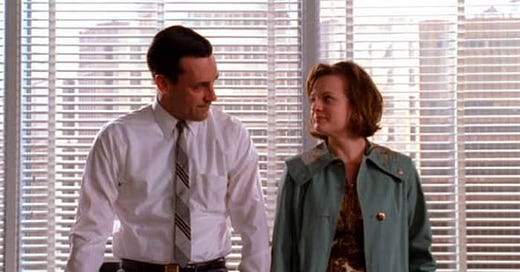Mad Men recently came back on Netflix, and as someone who has made her career in writing and marketing, what’s a girl to do other than start a rewatch?
[This post contains spoilers for Mad Men.]
Since I’ve already seen the show all the way through, I’m being choosy about the episodes I’m watching—so far, I’ve been focusing my energies on seasons three through seven. Through this selective rewatch, I’ve realized something: while Don Draper is an objectively terrible romantic partner, part of his complexity lies in the ways in which he chooses to be decent and even good towards (some of) the women in his life. Through much of the show, he steadfastly refuses to conduct his affairs with the women of the steno pool and reprimands his colleagues for doing so, and in his relationships with Anna, Joan, and Peggy, he is often quite the upstanding gentlemen.
Don’s long-term platonic relationship with protégée Peggy is not certainly without its flaws but does routinely keep him firmly in his moral lane. While he often takes her for granted, he course corrects when he realizes his mistakes. It’s clear that he values her as a colleague and as a friend; in season three, he says that if she leaves the agency, he will spend his whole life trying to hire her again, and he consistently relies on her in his personal life, making Peggy one of the only people we see him really open up to. Case in point: when his life has gone up in flames and he flees to California in season seven, Peggy is the only person he reaches out to, leaving everyone else hanging. And it’s not a one-way street—as far back as season one (though we don’t find out about it until season two), Don is the only person from the office to visit when Peggy is hospitalized and offers her the guidance that she needs to move on. As Peggy herself names, Don is her mentor and her champion, and while he isn’t always an ideal boss, he steadfastly lives up to his role as her advocate.
When it comes to Joan, Don fairly consistently offers her care and respect, including supporting her when she is in crisis. In the season five episode “The Other Woman,” Don is the only SCDP partner to object to Joan prostituting herself to win an account with Jaguar. Even Lane, one of the more socially decent male characters throughout the show’s run, isn’t fully against the idea, allowing his practical business side (and self-interest) to win out over his ethics. Don, on the other hand, storms out of the meeting, disgusted with the idea of pimping out his colleague/friend, resulting to such low tactics to win business, and specifically with Pete Campbell for bringing the proposition directly to Joan. He even takes it upon himself to visit Joan at home and let her know that no account, not even the white whale of Jaguar, is worth her selling herself for the company. It’s somewhat of a shocking moral high ground taken by a serial adulterer whose very identity was stolen from a dead Korean War comrade.
That said, when the situation doesn’t directly concern a woman with whom Don has built a relationship—or when he doesn’t realize that it does—his allyship melts away. Take the season four episode “The Summer Man”: when Joan mentions that a freelancer in the art department shared a sexist joke at the expense of one of the women in the office, Don responds with the ever-popular “Boys will be boys.” Had he known that Joan was directly affected, would he have acted differently? Would it have changed things if he knew what was said? We do see, later in the episode, that he is slightly offended at Peggy’s insinuation that he doesn’t care about the drawing, but he also doesn’t go out of his way to comfort Joan or to take action against the freelancer, leaving Peggy to handle it. Whether or not the latter was in support of Peggy’s growth as a manager is debatable.
One of the great questions around Mad Men is if Don Draper is really redeemable. While he rarely takes pains to make himself so, it’s clear that he is capable of being a true friend when he sees fit—and isn’t that the first step to becoming a good person?






First of all, great post: You solved a problem for me about one of the reasons I think Don D is an amazingly complex character: He is a bad boy outside platonic relationships with women and a good boy within. Do you know how long I've been trying to arrive at that conclusion? Answer: Too long.
But wait there is more: Did you ever notice that Don's most debauched relationships are with strong women (maybe not morally), but none of them can be squirreled away under the gendered mantra of the second sex. One is a successful artist, one is a business owner, one is successful consultant (not the German one), and so it goes.
Is it admirable that he only picks strong women? Hell no! Is it interesting? Well, it is to me. It reminds me a little about Macbeth. Towards the end of the play, we all know what a heel he is (sorry Achilles), but there is a fascination, at least for me, that even though the prophesies have been fulfilled and he knows his end is near, he goes down fighting.
It is this kind of writing that I think makes art. And it's posts like yours that remind me how much I love it.